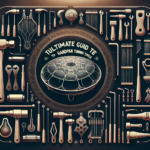Introduction
The handpan is a somewhat recent addition to the world of musical instruments, known for its unique sound and captivating design. This steel drum requires care and maintenance to preserve its tonal quality and physical integrity. For beginners, understanding the essentials of handpan maintenance can feel overwhelming. This article covers everything you need to know to ensure your handpan stays in top condition for years to come.
1. Handle with Clean Hands
One of the simplest yet most effective ways to maintain your handpan is by handling it with clean hands. Natural oils and dirt from your skin can accumulate on the drum’s surface, potentially affecting its sound and causing corrosion over time. Before playing your handpan, ensure your hands are thoroughly washed and dried. If possible, avoid playing it immediately after eating or using lotions, as residues can damage the instrument.
2. Regular Cleaning
Keeping your handpan clean is crucial for its longevity. For routine cleaning, use a microfiber cloth to wipe down the instrument after each use. This helps remove any fingerprints, dust, and residual oils. For a more thorough cleaning, you can use a gentle, non-abrasive cleaner suitable for steel. Apply the cleaner to a cloth and gently rub the surface of the handpan in a circular motion. Avoid using harsh chemicals or abrasive materials, as they can scratch and damage the handpan.
3. Protect from Extreme Conditions
Handpans are sensitive to environmental conditions. Extreme temperatures, high humidity, and direct sunlight can adversely affect your instrument. Keep your handpan in a controlled environment, preferably between 60-80°F (15-26°C) with moderate humidity. Use a case to shield it during transportation and when not in use. Avoid leaving your handpan in hot cars or cold, damp environments.
4. Use a Protective Case
A hard or soft protective case is an essential accessory for any handpan owner. It shields the instrument from physical damage, such as dents and scratches, which can significantly impact its sound quality. When choosing a case, ensure it fits snugly around your handpan, providing adequate support and protection without too much movement. Investing in a high-quality case can save you costly repairs and prolong the life of your instrument.
5. Tuning and Professional Maintenance
Tuning a handpan is a delicate process that should be left to professionals unless you have specific training. Over time, your handpan may go out of tune due to regular use or accidental impacts. Periodic professional tuning is essential to maintain the instrument’s sound quality. Additionally, professionals can inspect your handpan for any structural issues or signs of wear and make necessary repairs. Establish a relationship with a reputable handpan tuner or manufacturer to ensure your instrument receives proper care.
6. Avoid Sharp Objects and Jewelry
When playing your handpan, remove any jewelry or accessories that could scratch its surface. Rings, bracelets, and watches can cause nicks and scratches that might degrade the instrument’s quality. Similarly, avoid placing the handpan on rough or sharp surfaces. Always use a padded surface or stand specifically designed for handpans to prevent any accidental damage.
7. Proper Storage
Proper storage is vital for keeping your handpan in excellent condition. When not in use, store it in its protective case, away from direct sunlight and fluctuating temperatures. If you need to display it, consider using a dedicated handpan stand that offers stability and protection against falls. Never stack heavy objects on top of your handpan, as this can cause deformation and affect its sound.
8. Regular Inspection
Regularly inspect your handpan for any signs of wear or damage. Look for dents, scratches, or rust spots, especially around the playing surface and edges. Early detection of issues allows for timely repairs, preventing further damage. If you notice anything unusual, consult a professional handpan specialist to address the problem promptly.
Conclusion
Caring for your handpan is essential for preserving its sound quality and extending its lifespan. By adhering to these maintenance tips, beginners can ensure their handpan remains in optimal condition. Handle it with clean hands, keep it clean, protect it from extreme conditions, use a protective case, seek professional tuning, avoid sharp objects, store it properly, and inspect it regularly. With proper care, your handpan will continue to produce beautiful music for many years.
Frequently Asked Questions (FAQs)
- 1. How often should I clean my handpan?
- You should wipe down your handpan with a microfiber cloth after each use. For more thorough cleaning, do it once a month or as needed, depending on how frequently you play.
- 2. Can I tune my handpan myself?
- Tuning a handpan is a specialized skill that requires professional training. It’s advisable to seek professional help for tuning to avoid damaging your instrument.
- 3. What should I do if my handpan gets rusty?
- If you notice rust spots, gently clean the affected area with a non-abrasive cloth and suitable cleaner. For severe rust, consult a professional handpan specialist for proper treatment.
- 4. Is it necessary to use a case every time I transport my handpan?
- Yes, using a protective case during transportation is crucial to prevent dents, scratches, and other damages. A case provides much-needed protection and support for your handpan.
- 5. Can temperature fluctuations affect my handpan?
- Yes, extreme temperatures and fluctuations can impact the material and tuning of your handpan. It’s best to keep it in a controlled environment to maintain its quality.





